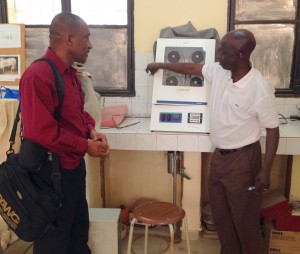Article by Edin Simms and Laina Schneider
“Mali is facing major hurdles caused by the coup-d’état, especially in agricultural education and training. These challenges are present in a wide geographic range, Bamako in particular, due to the influx of rural youth seeking perceived job opportunities,” said Ntam Baharanyi.
During January, Baharanyi and Youssouf Diabate, both of Tuskegee University – an InnovATE partner-visited Bamako and Katibougou, Mali, to assess the impact of the 2012 coup-d’état on agricultural education institutions. Their findings suggested that the crisis had a negative impact on the education and training system due to physical destruction, academic calendar disturbances, the inability to staff schools with teachers and reduced funding from government and donors.
The country of Mali has the 6th highest level of food insecurity with an estimated 1.5 million people living in food insecure households today and numbers expected to increase. This is partially due to natural disasters such as floods, pests, and droughts which have plagued Mali over the past decade. Compounding these issues is the social and political instability since the coup-d’état. With the help of the United Nations, Mali was able to transparently elect a new government in 2013.
After interviewing a variety of stakeholders including government officials, private sector management, and school administrators, the InnovATE team found that students and their institutions encountered many challenges due to the recent political instability. Faculty cited lower enrollment numbers due to immigration in order to flee violence. Government funding was cut and fees increased. Also, donors pulled out of the country, effectively shutting down agriculture related research and outreach activities. Infrastructure damage on campuses especially in the north was common.
Students had concerns about safety and finances in attending these institutions. Female students were forced to dress more conservatively and were seated separately from boys to satisfy the requirements of Muslim laws. “It is difficult to challenge the roles for women and girls in most traditional societies, but it will be especially critical that the existing gender gap is addressed in pastoral communities for northern Mali where less than a third of girls attend school,” observed Baharanyi.
The impacts of the crisis on agricultural education and training in Mali were exacerbated by pre-existing challenges such as the lack of practical opportunities for students, the shortage of teaching materials, and an over dependence on the federal government for funding.
After completing the data collection activities, Baharanyi and Diabate gave a debriefing to USAID Mali representatives highlighting key challenges and recommendations for moving forward. One of the recommendations the team gave was to take advantage of the crisis and reform curriculums through community a participatory approach that involves key stakeholders. USAID was also interested in the infusion of technology transfer and the scaling up of appropriate technology through agricultural education.
“Mali should not feel alone in their effort to meet post conflict challenges. With appropriate interventions, agricultural education in Mali can become a force of agricultural growth – improving food security, and reducing poverty. To do this, greater attention must be paid to student needs and efforts must be made to form beneficial partnerships with the labor market.”


